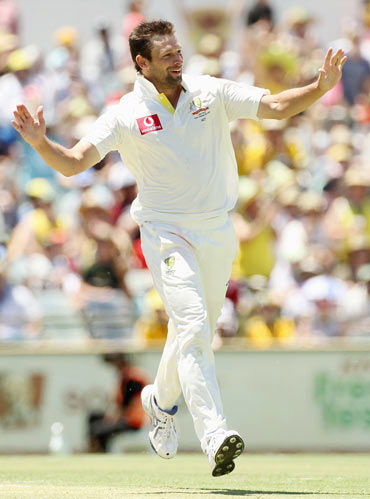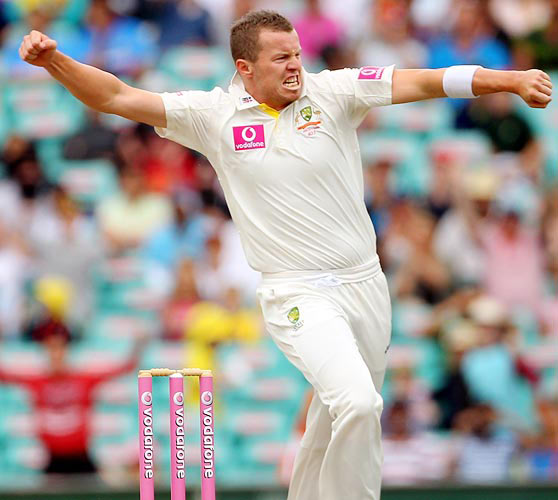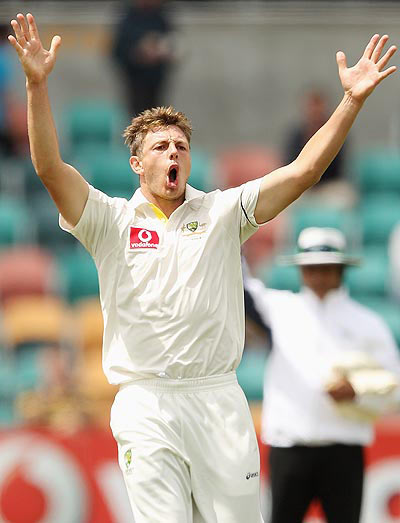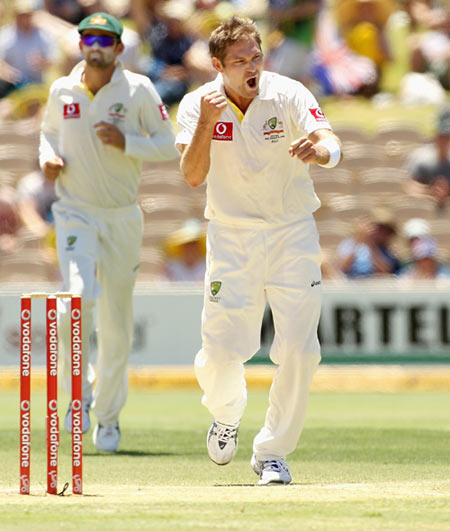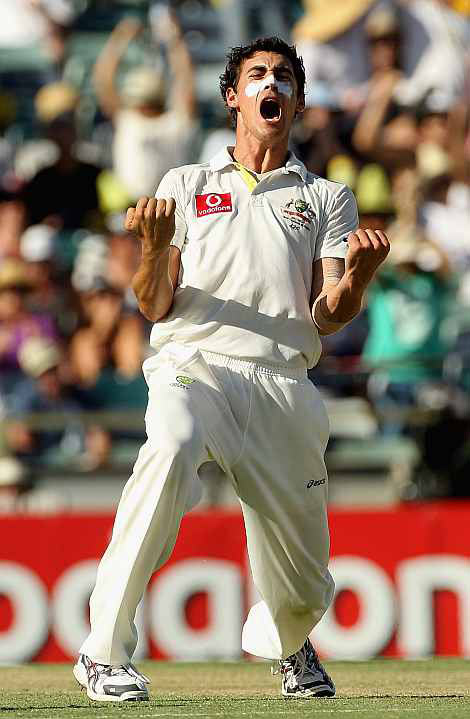 | « Back to article | Print this article |
Deconstructing the pace that demolished India
Bikash Mohapatra analyses how Australia's largely inexperienced bowling attack dismantled India's famed batting line-up.
The Australia versus India series was a battle of contrasts.
It was a largely inexperienced bowling attack taking on a famed (and overtly hyped) batting order, one that boasted of over 30, 000 Tests runs and above 50 centuries.
On paper, it seemed a lost cause for the home team.
The Australian bowlers had been a severely criticized in recent times. They looked ordinary during the Ashes early last year, as well as the preceding series against India.
Besides, they had a plethora of injury worries.
Among the Cricket Australia contracted players (read bowlers) in the casualty were Mitchell Johnson (with a foot injury), Doug Bollinger (hamstring strain), Shane Watson (calf injury), Ryan Harris (hip injury), Josh Hazlewood and Pat Cummins (both with stress-related foot problem).
However, the appointment of former fast bowler Craig McDermott as the bowling coach last May proved a masterstroke.
McDermott, himself a successful bowler with 291 wickets in 71 Tests between 1984-96, had terrorized the Indians when they toured Down Under in 1991-92, a five-match series which witnessed the visitors getting drubbed 4-0.
Two decades later, he again plotted India's downfall, in the process using the resources available at his disposal in the best possible manner.
The Australian tactic of pitching up to the Indian top order paid rich dividends as their pace battery accounted for 71 of the 80 Indian wickets to fall, thereby ensuring the home team a series whitewash. Herewith, an analysis of the Australian pace brigade's performances that completely exposed the chinks in the Indian batting.
Illustration: Reuben NV
Hilfenhaus justified his selection
Ben Hilfenhaus (Four Tests, 27 wickets)
His selection to the team raised many eyebrows.
There were many who doubted his ability, considering the series against India was a high-profile one. The doubts were justified to an extent.
The last occasion the Australians had toured India, in October 2010, the 28-year-old failed to impress.
He did manage six wickets in the two Tests played, but had been both expensive (@ 43.50) and ineffective, his efforts not enough to prevent his team suffering defeats in both the Tests.
However, Ben Hilfenhaus was aware this was his chance at redemption, an opportunity to impress those selectors who had faith in his ability.
Figures of 5-75 in the first innings of the opening Test in Melbourne proved the curtain raiser. He finished the Test with seven wickets before proceeding to pick another eight – including a 5-106 in the second innings – in the Sydney Test.
The bouncy track at the WACA (Perth) ensured another eight wickets for Hilfenhaus while he added four more on the flat deck at Adelaide.
Even as the series ended with an empathic 4-0 triumph for Australia, Hilfenhaus had bolstered his credentials with a haul of 27 wickets (@ 17.22) - finishing as the most prolific bowler on either side. It was his best effort in a series, surpassing the 22 wickets (@ 27.45) secured against England in 2009 Ashes.
At the end of it all, Hilfenhaus had justified his selection. He had, through his performance, given his critics the best possible answer.
Siddle was accurate, and consistent
Peter Siddle (Four Tests, 23 wickets)
To start with, it is imperative to mention Peter Siddle made his Test debut against India -- in the second Test in Mohali in October 2008.
More importantly, Sachin Tendulkar was his first Test wicket.
However, it was overall a forgettable series for both Siddle – who finished with just four wickets (@ 44.00) and his team – Australia lost the four-match series 2-0.
Siddle albeit made his mark in the following home and away series against South Africa, picking 25 wickets in six Tests – and followed it up with a haul of 20 wickets (in five Tests) in the 2009 Ashes tour, including a 5-21 in the fourth Test in Headingley (Leeds), the only Test which Australia won on that tour.
The 27-year-old somewhat lost his way thereafter before getting back on track in the home series against New Zealand, when he picked up nine wickets in two Tests.
Against India, he bowled with amazing consistency and great accuracy to pick up 23 wickets in the for Tests played (@ 18.65), including a five for 49 in Adelaide, a performance that helped him with the man of the match honours while also ensuring his team a series whitewash.
Young Pattinson has surged into the record books
James Pattinson (Two Tests, 11 wickets)
Along with Pat Cummins, James Pattinson is one of the best young fast bowlers Australia has unearthed in recent times.
It was irony that an injury to Cummins helped Pattinson get his first Test cap – against New Zealand at the Gabba (Brisbane).
The 21-year-old grabbed the opportunity with both hands, winning the man of the match honours on debut – his five for 27 in the second innings helping Australia secure a comprehensive win. He followed it up with a five for 51 in first innings and three for 54 in the seconf of the final Test in Hobart.
A haul of 14 wickets (@ 14.00) in the two Tests was enough to earn Pattinson the man of the series honurs.
The Victorian carried forward the form to the series against India, picking six wickets in the opening Test. However, it was his resilience with the bat that helped his team's cause in Melbourne.
Pattinson scored 18 not out and 37 not out in each innings to help Australia pocket the Boxing Day Test inside four days, while picking his second man of the match honour in the process.
The 21-year-old continued in the same vein in Sydney, his figures of four for 43 helping his side shut out India for a paltry 191 in the first essay. Pattinson managed 11 wickets (@ 23.36) in the first two Tests before a foot injury ruled him out of the next two.
However, it was enough to help him surge into the record books as the first bowler in 30 years – after compatriot Terry Alderman - to take a staggering 25 wickets in just four Tests.
Harris made crucial breakthroughs
Ryan Harris (Two Tests, six wickets)
If one goes by numbers he will be left disappointed. For Ryan Harris managed just six wickets in the two Tests he played.
However, if one looks at the context in which those wickets were achieved, one can't help but agree with Australian captain Michael Clarke's oft-repeated statement, that 'Ryan Harris is as good as any other bowler in business'.
The 32-year-old got Sachin Tendulkar out leg before for just 15 as Australia bowled out India for a paltry 161 in the first innings of the third Test at WACA (Perth).
In the second innings, Harris provided the most vital breakthrough as well, crashing through the defence of Rahul Dravid (47) when the veteran had put on 84 for the fifth wicket with Virat Kohli (75), a partnership that frustrated the home side.
Even in the fourth and final Test in Adelaide, a 114-run stand for the sixth wicket between Kohli and Wriddhiman Saha was negating the early advantage that the Australians had secured. It was left to Harris to ease those jitters, by rattling the stumps of the latter.
The bowler had a three-wicket haul in the second essay as India were bowled out for a meager 201 and Australia completed a whitewash.
Starc was impressive in Perth
Mitchell Starc (One Test, four wickets)
Mitchell Starc was the proverbial horse for the course.
A modest debut in the preceding series against New Zealand, where he took four wickets in two Tests, helped him retain his place in the squad against India.
Seemingly bouncy conditions for the third Test at the WACA meant Starc was drafted into the squad in place of Nathan Lyon.
Starc, who turned 22 today, justified the selection by picking up four wickets in the match, helping Australia wrap the series 3-0.
He was particularly impressive in the second innings, getting Gautam Gambhir out with a snorter before trapping Sachin Tendulkar plumb in front.

